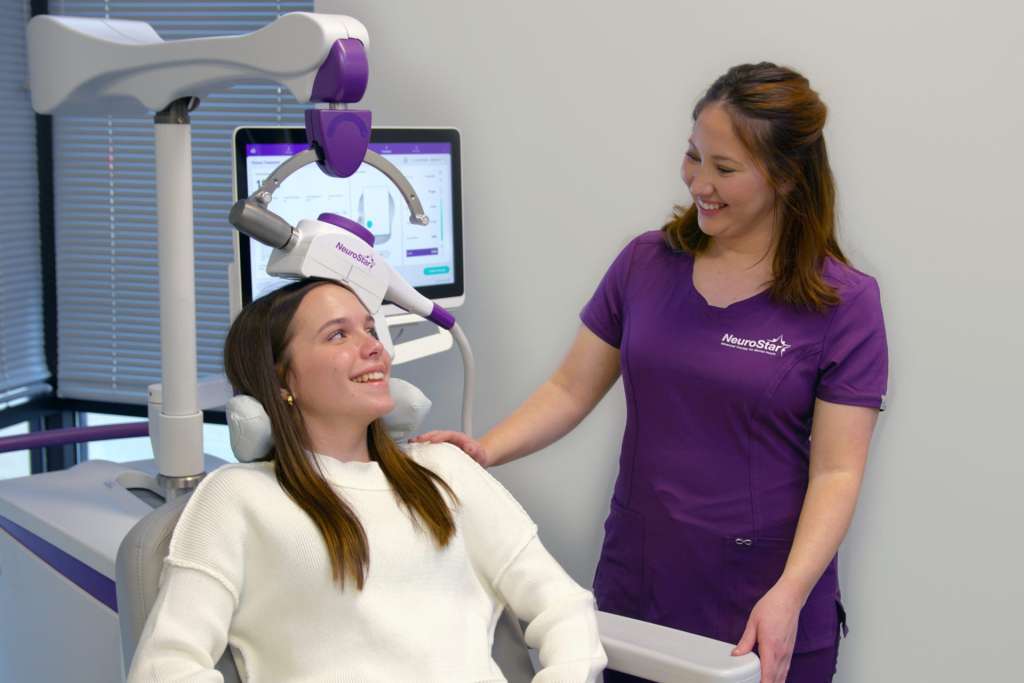Many PTSD patients do not respond to standard treatments like therapy or medication, especially those with co-occurring conditions such as depression, traumatic brain injury (TBI), or substance use disorders. TMS offers an alternative for those seeking new solutions.


TMS delivers electromagnetic pulses to stimulate brain regions involved in trauma processing and emotional regulation, such as the ventromedial prefrontal cortex (vmPFC). This helps restore normal brain function and alleviate symptoms.
Why TMS Works for PTSD
PTSD affects key brain structures:
TMS helps normalize brain activity, reducing PTSD symptoms and improving emotional resilience.

TMS therapy typically involves five sessions per week for six weeks, followed by a tapering phase. Many patients experience:
While individual responses vary, many patients notice positive changes within weeks, making TMS a promising alternative for PTSD treatment.
Id nisl lacus penatibus bibendum vitae lectus et a. Lorem nulla nulla nulla faucibus amet feugiat ultricies. Posuere arcu enim.
Id nisl lacus penatibus bibendum vitae lectus et a. Lorem nulla nulla nulla faucibus amet feugiat ultricies. Posuere arcu enim.
Id nisl lacus penatibus bibendum vitae lectus et a. Lorem nulla nulla nulla faucibus amet feugiat ultricies. Posuere arcu enim.
NeuroStar is a noninvasive, outpatient treatment that takes as little as 19 minutes per day. During each session, a cushioned coil is precisely placed against your head while magnetic pulses deliver the therapy to the correct location that regulates mood in your brain.


Lorem Ipsum is simply dummy text of the printing and typesetting industry. Lorem Ipsum has been the industry’s standard dummy text ever since the 1500s, when an unknown printer took a galley of type and scrambled it to make a type specimen book.
Lorem Ipsum is simply dummy text of the printing and typesetting industry. Lorem Ipsum has been the industry’s standard dummy text ever since the 1500s, when an unknown printer took a galley of type and scrambled it to make a type specimen book.
Lorem Ipsum is simply dummy text of the printing and typesetting industry. Lorem Ipsum has been the industry’s standard dummy text ever since the 1500s, when an unknown printer took a galley of type and scrambled it to make a type specimen book.
Lorem Ipsum is simply dummy text of the printing and typesetting industry. Lorem Ipsum has been the industry’s standard dummy text ever since the 1500s, when an unknown printer took a galley of type and scrambled it to make a type specimen book.
Lorem Ipsum is simply dummy text of the printing and typesetting industry. Lorem Ipsum has been the industry’s standard dummy text ever since the 1500s, when an unknown printer took a galley of type and scrambled it to make a type specimen book.
The initial comprehensive evaluation is an extensive meeting that usually lasts for an hour.
During this meeting, your provider will go over your detailed history and conduct an assessment to get a clear picture of your current mental health and answer any questions you may have.
The initial comprehensive evaluation is an extensive meeting that usually lasts for an hour.
During this meeting, your provider will go over your detailed history and conduct an assessment to get a clear picture of your current mental health and answer any questions you may have.
The initial comprehensive evaluation is an extensive meeting that usually lasts for an hour.
During this meeting, your provider will go over your detailed history and conduct an assessment to get a clear picture of your current mental health and answer any questions you may have.

930 N Mullan Rd Ste 1, Spokane Valley, WA 99206, United states
509-694-3135
509-694-3135